Hi hellooooo <3
I will say now that I am exhausted. Not sure what to make of anything at this precise moment in time. We’re a third of the way into July already (whoops) and it’s certainly been something but I don’t know what. ‘Easy to Love’ by the Jezabels is playing. There are lollies on the table. I am making you earl grey tea.
go out & love someone
This is about to be so indulgent. Like more than usual.
I very recently returned from a trip to Sydney, my first in three years. I grew up in the area around Maroubra, with beaches and bottlebrush trees; I attended pre-school, two primary schools, and high school all within walking distance of the same parklands. I think there’s a lightrail in the area now finally, and the old bus routes have changed as a result. I didn’t revisit any of those places, but I did go to my high school reunion, which was weird not only because 2017 was five years ago. I enjoyed seeing many of my closest friends, who I have so much love and time for. I did find that I had nothing to say to many people or at least no energy to explain my life to them, even girls I was friendly with in high school. I was able to see and stay with relatives, and that was lovely too. Children are delightful and I did spend a moment at hotpot marvelling that I had ever been a four-year-old.
Leaving, I thought a lot about the books that Melina Marchetta refers to as her ‘inner west trilogy’ — Saving Francesca, The Piper’s Son, The Place on Dalhousie — set in the inner western suburbs of Sydney and including a group of recurring characters four or so years apart. I actually touched on this in my first newsletter, but it is a series that has resurfaced in my life again and again, from the time I read Saving Francesca not long after turning fifteen. At the start of the year, I was reflecting on growing up, and also when Ball Park Music said, holy are ghosts and girls from high school. Even the six months since then is wild. People have been tolerating this for six months(!)
Specifically, I found myself lingering on Dalhousie, listening to my playlist for the book on my bus and two trains to the airport (where my flight was cancelled and a new one organised for the next morning, but that’s another story). In an interview, Melina Marchetta spoke to the idea of being predictable even across genres, in the sense that she often writes the same ideas — stories about family, identity, community, grief, healing. But Dalhousie has a particular lightness to it that I love, whilst its position as the final book in a companion series makes it both bittersweet and heartwarming. I will get to that though.
Dalhousie has three main characters: Jimmy, who has never really known family; Rosie, who lost both parents as a teenager and had a brief affair with Jimmy when they were both in countryside Queensland during the 2009 floods; and Martha, Rosie’s stepmother who connected with Rosie’s late father during a period of mutual grief, now grieving for him. Two years after Jimmy meets Rosie, Rosie has a young son and has moved back to her childhood home, a house on Dalhousie that was the lifelong project of her father Seb. Rosie and Martha share the house and an antagonistic relationship, forced to coexist for the moment.
And so this book about grief, and connection, and community. There’s always a moment in reading a Marchetta novel when the protagonist begins to open themselves up to the rest of the world, and a montage of routine conversations and interactions builds into a tangle of connections, threads slowly woven together into something life-affirming. Martha is lonely at the beginning of the novel when some of the girls from her high school netball team decide to restart the team, now as adults with lives and jobs and children; the result is shared histories and old dynamics and the beer garden after games. There’s the mother’s group that Rosie reluctantly attends and the two she finds herself making friends with, until all three are driving to Maroubra in the early morning to take Rosie’s belongings back from her ex-boyfriend. There’s Jimmy’s school friends, Francesca and Tom and Tara and Siobhan in London and Justine in ‘fucking Melbourne’, who fall into easy conversation and don’t see each other as often as they would like. There’s the trust that begins to grow between Rosie and Jimmy with their son Toto between them, and then respect between Rosie and Martha, with Jimmy there to draw them together.
It’s a lot of characters and I haven’t even touched on every relationship or the Italian neighbourhood and Rosie’s nonna, but really it’s as straightforward as a weekend at the netball courts and the conversations that happen there between friends and friends of friends. Moments of understanding and miscommunication build up between characters, and the reader is pulled along without realising.
“Naw, let him go on thinking he’s special.’
And Rosie could tell that no one had ever told Jimmy he was special.
I care about them SO much. Both have reasons to be wary of a deeper relationship, including and especially the fact that Jimmy lost his phone for months and didn’t know Toto existed. The way they come together, Toto at the centre, never feels forced, and then there is a reveal that left me stunned that could only be done so effectively in a Marchetta book.
Rosie and Martha form the other core relationship of the book. It’s not a coincidence that the book ends once they explicitly welcome one another into their lives and the house, and their fragile relationship evolves into helping one another and accepting help. Two stubborn people, suspicious of one another when really they have love and grief for the same man, and share the experience of losing their mothers to breast cancer beyond that. It’s easy to forget that Rosie is just twenty-one, forced to grow and adapt rapidly at such a young age.
Sometimes Rosie wants to laugh at what Martha says, but doesn’t want to give her the satisfaction. She doesn’t want to ever let Martha know that there are things around the house that bring Rosie comfort.
One line from Martha’s point of view is presented innocuously, a passing thought, and in fact summarises a crucial idea: “perhaps they’ve all walked that thin line of despair”. In a book so deeply about community, Marchetta explicitly acknowledges that we are not alone in our suffering. Orla Gartland voice you’re not special babe / I know you feel like your life is one big mistake / I am right there on your side and Katie from MUNA voice I know it’s not just me who thinks it is just me. It’s an awareness on Marchetta’s part that makes her novels work so well, depicting turbulent relationships and ‘troubled’ characters with ease.
I do have to talk about the gang, the ones who have been together since Saving Francesca. So much to unpack so I am deepdiving. Saving Francesca is mired in adolescent experience, very much a novel about being seventeen in high school. The Piper’s Son is the grief of a family breaking apart, and Tom Mackee’s angst as he tries to navigate being twenty-one, including opening himself back up to the girls from school. Dalhousie is finding direction at the age of twenty-five, not old but not young, Jimmy Hailer returning to his hometown to find his friends talking about things like stability and the future, “stuff they didn’t seem to worry about a couple of years ago”. Still, they have each other, even after uni friends and work friends and some people moving away and Tom’s self-destruction and Jimmy’s bouts of disappearance.
He’s home, and he knows he’s home because they’re here and that’s the way it is, just the certainty that one of them will always be around, and it feels like everything’s going to be okay in a way that it hasn’t since that phone call, and he’s hugging the three of them because he’s become the sort of person who goes straight for the clinch, because once that hug came from Frankie Spinelli years ago he knew his days of holding back were over.
I think about this quote a lot, all the time. On Friday, someone asked me if I consider myself a Sydney-person or a Melbourne-person (very Melbourne question to ask), and it was something I had been pondering myself. I am fond of both cities now, and for such different reasons. The idea of home being people has been rotated repeatedly in so many directions. It’s true though. I feel very lucky to have people I love in so many states and countries. I don’t have Jimmy’s conviction — home a hug outside Central station, of all places — but it is touching to read. Even just the depiction of a group of high school friends whose friendship evolves with adolescence and young adulthood but remains intact; On the Jellicoe Road contains the line “We’re going to know him for the rest of our lives” and though it’s not true for spoiler reasons, it bounces around my head like a ping pong ball, as someone who has known many of my closest friends for five or ten or fifteen years.
And Jimmy. James Hailler. Who has had to find and make a family in so many ways, from following Frankie home and coaxing conversation from Frankie’s sick mother to now,
Toto’s amused by their laughter. Jimmy is moved by it. These guys always came up with the goods. Great families to be part of, beds to sleep on, food on the table every time he was in their homes. But Toto’s the first thing Jimmy has had to offer and he’s overcome by what it means to him.
I do wish there were more scenes with the original group, though they each have separate lives now, and anyway it’s a book about much more than just Jimmy. Still, another scene that never fails to move me is all of them flying into Quilpie airport — including Siobhan and Will from Europe — to see Jimmy get married. “And they toast to them being together”. Something special about Marchetta’s books is moments like this, brimming with warmth, almost as if human connection is crucial and inherent to belong alive.
It’s like the refrain in ‘Bros’ by Wolf Alice, Are your lights on? Are your lights still on? I’ll keep you safe if you keep me strong. ‘Bros’ is an ode to Ellie Rowsell’s best friend and former bandmate, and truly one of the all-time songs. It’s a lovely image — a house or even a single room with the lights kept on — the idea of staying up and waiting for someone, of providing a welcome. Shake your hair, have some fun / forget our mothers and past lovers, forget everyone. Friendship of the unshakeable kind. You’re my best friend and we’re dancing in this world alone. We’re going to know him for the rest of our lives.
Something else that Dalhousie does well is depict the messiness of young adulthood and actual adulthood in equal measure in a way that reminds me overwhelmingly of Please Like Me. Please Like Me is another piece of media close to my heart for the way it depicts life with humour and nuance. Each character is given room to be messy but they are still presented as people, worthy of the love and patience and friendship that they receive from those around them. I finally watched the show for the first time in 2020 lockdown and couldn’t bear to rewatch for a while, because the dialogue is so incredibly real (Silly Josh voice “Okay! So we’re doing this today!”) that it made me yearn for that kind of livelihood. I did however rewatch the series in full earlier this year, and made the alarming realisation that Jordan and Grace and I in particular converse as though we are in our own gay little Australian comedy television show. It would probably be those two (actor and film person) with me as a recurring character which is bestieship regardless.
I don’t know if there is something about Australian media that is particularly true at depicting mundanities and the profoundness of relationships between people, or if I just feel connected to these stories. I genuinely don’t think anybody talks about growing up like Australian indie/pop girls either and as usual, I have a playlist for this. I was seventeen listening to Alex Lahey sing you only drink cider and you’re aching to move out of home and I was like yeah I will adopt that into my personality.
There’s definitely an argument to be made. For example: Marchetta dialogue! Everything to me! Actually it’s my newsletter so I will post these and move on!
“Fake boobs,’ she says, but then realises what she’s said. ‘Sorry I mentioned the boobs.’
‘Why? Mine aren’t going anywhere.”
Mackee is looking unimpressed by the news.
‘Justine in Melbourne. Siobhan in London. Frankie in fucking Oatley,’ he laments.
‘Tom, it’s a twenty-minute drive from your house, and it’s on the train line,’ Frankie points out.”
I do feel the need to talk about Derry Girls. Let’s do that. It’s very adjacent to Please Like Me in my mind, partly because I don’t watch a lot of television, and partly because both shows are perfect to me. Derry Girls is not Australian, and in fact quite grounded in the Irish town of Derry. It’s such a friendship and shenanigans show and I simply adore these girls. The final season was released this past April, and it doesn’t quite live up to the first three — too many episodes hinge on misunderstandings, and there were certainly some narrative decisions with regards to Clare — but is still very, very good. A rush of emotion to see the girls growing up and graduating, and then there is the fact that it ties into a free Derry. Actually, it comes back to what I have been talking about all along, which is the notion of community and the connections between people and our connection with the world around us.
My favourite episode is of course s1e6 (at one point I considered a newsletter presenting a definitive episode ranking) and I think it’s difficult not to be moved by that final scene — Erin coming to the defence of her cousin and best friend, and reconnecting with her other best friends, and ‘Dreams’ by the Cranberries playing while they dance together, intercut with the parents at home watching the news, Grandpa Joe’s hand on Gerry’s shoulder.
I have gone on and on already. I can’t leave without talking Gang of Youths’s album Go Farther in Lightness, which I listened to it a lot at the end of 2017 and the beginning of the next, a time when I was moving out of high school and into university, and from Sydney (say yes to sticking with a city through a thousand days of rain) to Melbourne for family reasons. Historians might remember my obsession with ‘Let Me Down Easy’ at one point in time, especially the chorus:
you wanted to fight for a cause / then go out and fall in love / don’t stop, don’t stop believing / in truth and grace in the grievance / you want someone to want you for who you are / i want someone to try, then let me down / easy, easy tonight
So much of what I believe in, in a few exhilarating lines. Go out and love someone! It’s not a bad time, time spent with you / there’s cool lights and songs with good lyrics is a line from the same song that feels like it was written to be sung by a slightly drunk crowd on a weeknight, which brings me back to Dalhousie, and the joy of Martha and Ewan at a concert, which reminded me of the younger gang sneaking out to a concert in Coogee in Saving Francesca, and the way concerts (and clubs) are about people sharing a space and a moment, moved by the same melodies and rhythms. Truly life-affirming stuff. Any use of song in Pride (2014) as another example. We are nothing without connection. Hold on to each other!

in another dimension
Speedrun of what I have been up to. Recently went to Sydney. Before that, I carried complex emotions through June, and had a lot of fun too. Went to a book sale and bought Anouilh’s Antigone amongst other books, an exciting find because I had wanted to read it for SO long. Saw some dear friends, listened to some poetry, saw a Virgil manuscript. Went to a cute pride event with fantastic vibes and an embroidery workshop that absorbed all of my time and energy for that afternoon. Thought about my options for the next part of my life. Practiced thinking of my life as something with impermanent parts. Cried to Allie X. Et cetera.
Rewatched Paddington 2 and Kung Fu Panda 2, two fantastic little movies about finding/making your way in the world. I wish I was a panda or Peruvian bear but we can’t have everything, I had originally typed anything which also works in This Economy. Watched Little Women (2019) for the first time and it was charming and made me weep, the emotion and bursts of happiness and the way childhood can slip away and then it’s over. Finished Jade Legacy across two plane trips and a few train ones, insane book to conclude a trilogy that was so intricately plotted and absolutely a must-read for fans of fantasy and fantasy wars and books about family. The main problem is that after two and a half(ish) books of being an Anden Emery hunter he ends up having a lovely life and boyfriend like okay now what do I do. Anyway. I picked up Omar Sakr’s debut poetry collection These Wild Houses from Dymocks on George Street and enjoyed it immensely! Hoping to read Nghi Vo’s The Chosen and the Beautiful and perhaps Zadie Smith’s Swing Time next. I’ve been really into ‘2shy’ by Shura, which I won’t get into. Also been listening to a lot of Frank Ocean, one of our greatest living poets. And MUNA’s self-titled is quite brilliant to me. <3
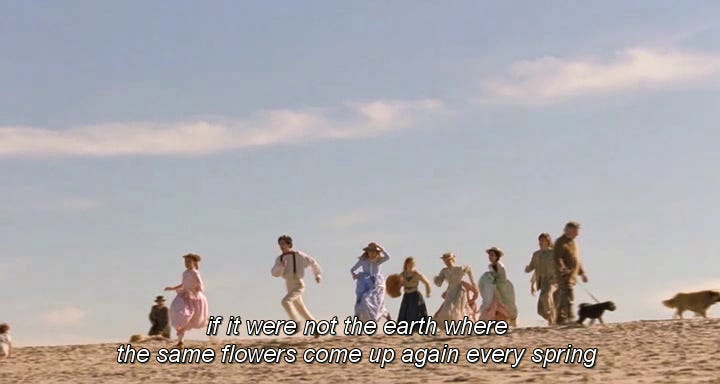
Truly I adore Melina Marchetta, whose only flaw is writing police characters sometimes. Absolutely no thoughts in this just pure vibes for like 3000 words which got repetitive but it is important to ME.
Hopefully a break from me for a while, finally. Thank you as always.
Joanne



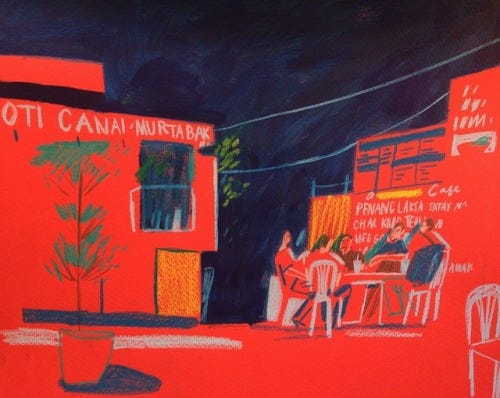
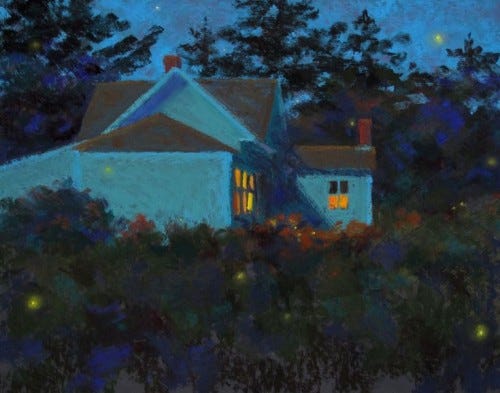
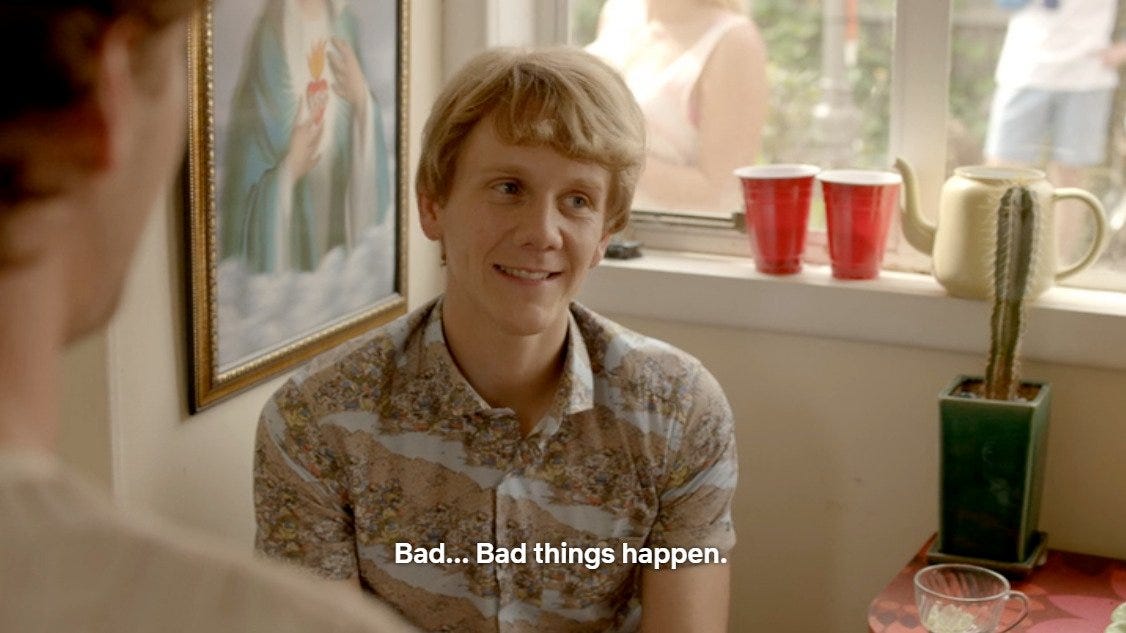
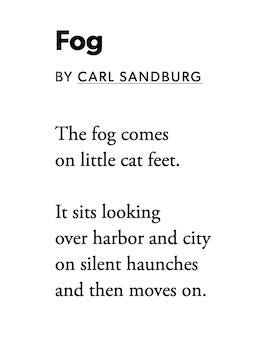

This reminds me I owe you Groundswell anthology